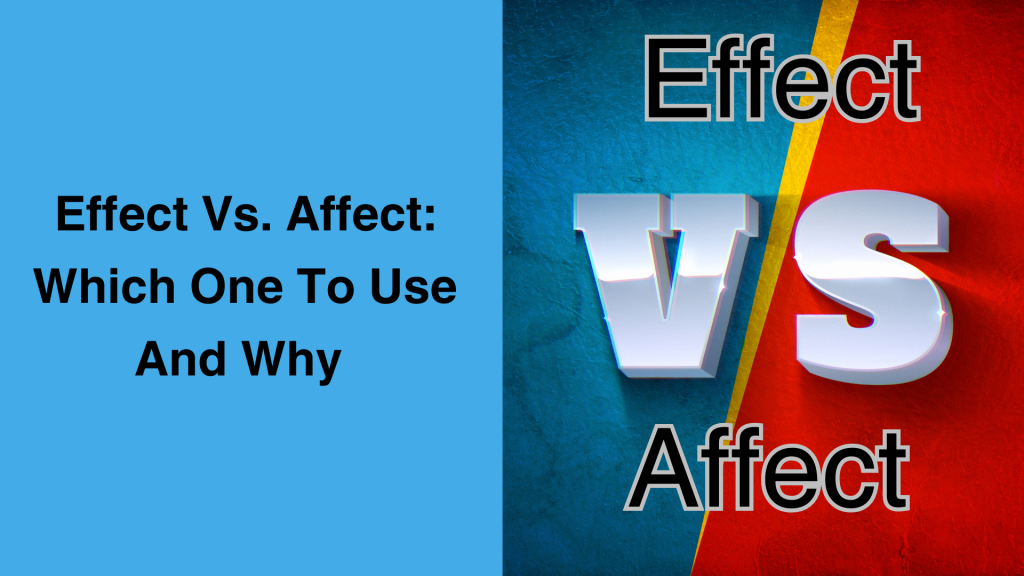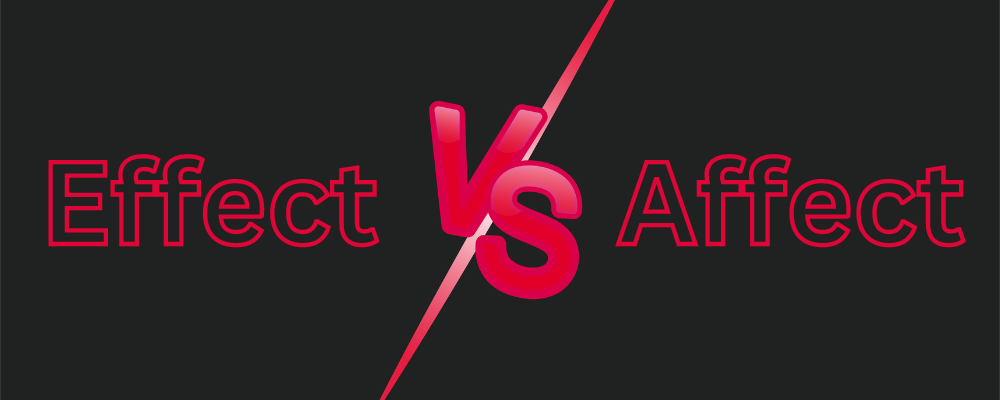Effect vs. Affect: Learn the Difference Once And For All

Similar words, like “affect” and “effect,” consistently trip people up. These are tricky because they look similar and sound the same when spoken but have different meanings. If you have trouble with these, you’re not alone. Today’s guide will set the record straight on when you should use effect and when you should use affect.
Using the right word isn’t just about technical correctness. Errors can change the meanings of your sentences and make your writing feel amateur. On the other hand, using the right word at the right time ensures you’ll get your point across and shows a good command of language. So, let’s dive in and conquer effect vs. affect once and for all!
Effect Vs. Affect

This infamous duo might seem interchangeable, but they have distinct roles. They’re tricky because they are homophones, which means they sound the same when spoken but are spelled differently and have different meanings.
Related: Whoever vs Whomever – How To Use Them Properly
In truth, their meanings are somewhat similar, which adds to the confusion. Let’s start by looking at when to use affect and when to use effect. Then, I’ll give you some tips and tricks to remember which word to use when, go over some examples, and answer some frequently asked questions.
When To Use “Effect“?
Effect is a noun and refers to the result or consequence of an action or event. So, any time you’re referring to the result of something happening you’ll use effect. Here’s how it can be used in sentences:
- The new medicine had a positive effect on her symptoms. (The medicine produced a beneficial result.)
- The special effects in the movie were amazing. (The result of the visual effects techniques used were impressive.)
- The economic crisis had a devastating effect on many families. (The crisis had negative consequences.)
- What effect do you think this decision will have? (We are asking about the consequence of the decision.)
When To Use “Affect“?
Affect is a verb and generally refers to influencing or having an impact on something. So, anytime something affects something else, you’ll want to use affect. Remember, “affect” is all about causing a change. Here are some examples of how affect should be used in sentences:
- The loud music affected their concentration. (The music influenced their ability to focus.)
- The new trade policy will affect businesses nationwide. (The policy will have an impact on businesses across the country.)
- Stress can affect your physical health. (Stress can influence your physical well-being.)
- Seeing her old friend after all these years truly affected her. (The reunion had a strong emotional impact on her.)
Each example shows how something is affecting something else and causing a change to it.
How To Remember When To Use Effect Vs. Affect
With the general ideas out of the way, let’s look at some handy tricks for remembering when to use Effect vs Affect. For the first tip, you can look at the first letter. The “a” in affect is the “action” of causing a change, and the “e” in effect is the “end result” or consequence of an action.
You May Also Like: What Are Literary Devices? List & Definition Cheat-Sheet
And if you’re still unsure whether to use “affect” or “effect,” try rephrasing your sentence with a different verb. If “cause” or “influence” fit grammatically, then “affect” is likely the correct choice. If “result” or “consequence” work better, then “effect” is your word.
Effect Vs. Affect: Frequently Asked Questions

Here are some frequently asked questions related to effect vs affect that haven’t been covered above.
1. What About Effective vs. Affective?
Most of the time people are looking for effective in this curcumstance. Effective is an adjective describing something that produces a desired effect or has a successful outcome. For example, “The teacher used effective teaching methods to engage the students.” In cases such as this, it’s always effective with the e.
However, affective is also a word. It’s an adjective related to emotions or feelings. For example, “The movie had a powerful affective response on the audience.” Just like we covered above, you can remember “affect” as something that influences something else.
2. “Something to that Effect”
Something to that effect is a versatile way to convey the general idea or gist of something that was said or shown without directly quoting it. It can be used in various situations, such as paraphrasing someone’s statement without exact wording, and you want to use “effect” for this phrase.
- Example: He muttered something to that effect about disliking the new restaurant, but I didn’t press him for details.
It can also be used to summarize the main point of an idea or concept.
- Example: The article discussed the importance of sustainability in fashion, with something to the effect that eco-friendly practices are becoming increasingly crucial for the industry.
Lastly, it can also be used when you can’t recall the specifics but want to acknowledge a related concept.
- Example: There was a news report recently about a data breach, something to that effect. I’ll have to look it up for more details.
Why “Effect” Is The Correct Word
Here’s a breakdown of why “effect” is the correct word in this context:
- Effect (as a noun) refers to the outcome or result of something.
- In “something to that effect,” the “something” refers to the outcome or result of what the person said. It’s the overall meaning or idea you’re trying to convey, not the specific wording.
3. Is “Affect” ever a noun?
In rare cases, “affect” can be a noun in psychology, referring to an observable emotional response. For example, “The therapist studied the patient’s affect during the session.” This refers to the outward emotional expressions; in this case, it’s a noun.
4. Can “Effect” ever be a verb?
Again, in rare cases, “effect” can be used as a verb, but this usage is discouraged in formal writing. It would mean “to bring about” or “to cause.” For example, “The magician effected a mind-boggling disappearance.” This emphasizes the unusual nature of the verb usage.